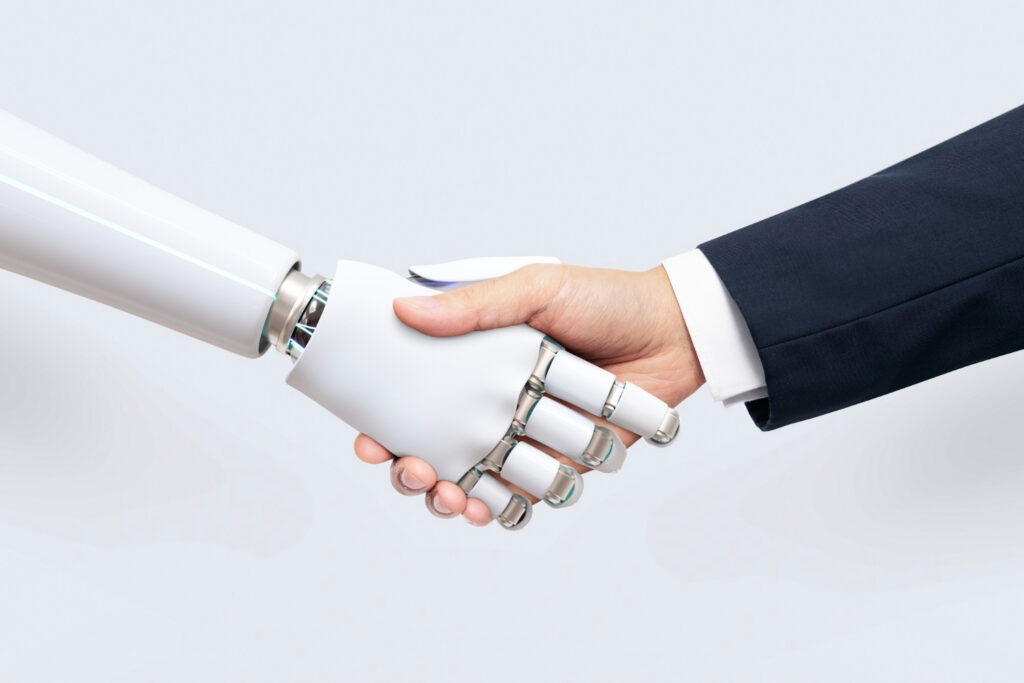“IBM asserts that chatbots are capable of addressing 80% of routine tasks and customer inquiries, showcasing the significant potential of these automated systems ” – Sanghee Lee, General Manager, APAC.
Chatbots serve as a dynamic tool that provides instant customer support, assisting with inquiries, and offering real-time solutions. What’s more, chatbots enable personalized shopping experiences by analyzing customer preferences and offering tailored product recommendations. This automated capacity streamlines the service process and also allows staff to focus on more complex customer needs, improving operational efficiency and sales.
What Is the Goal of A Chatbot?
A chatbot is an automated computer program that simulates and processes human conversation. Chatbots respond to customer text or voice queries, helping them find information, resolve issues, or complete tasks quickly. They’re becoming an essential tool for businesses aiming to streamline customer interactions and enhance engagement.
Do All Chatbots Have AI Capabilities?
Not all chatbots are equipped with artificial intelligence (AI). However, they are increasingly able to use conversational AI techniques, such as natural language processing (NLP), to understand customer inquiries and automate responses. NLP enables chatbots to recognize context, language patterns and intent, facilitating more intuitive and accurate responses to customer questions.
How are Chatbots Used in Retail?
In retail, chatbots improve customer interaction and simplify many aspects of the shopping experience. These digital assistants offer real-time support by answering questions about products, pricing, availability, and return policies. Moreover, beyond the basic inquiries, chatbots guide shoppers through each stage of their shopping journey, from product recommendations to checkout, making them invaluable for online and in-store retail settings.
Why is the Retail Industry Turning to Chatbots to Improve the Customer Experience?
Consumers today expect rapid, personalized service. With 77% of shoppers expect immediate support when they reach out to a brand, self-service chatbots allow retailers to meet this demand. Chatbots enable instant assistance, even when human agents are unavailable. They bridge the gap between customer needs and retailer capabilities, allowing brands to deliver fast, reliable support without requiring a large customer service team.
How Do Chatbots Enhance Customer Engagement?
Chatbots provide real-time, interactive conversations that help resolve common customer issues, troubleshoot shopping challenges, and simplify the buying process. These digital interactions help to create a friction-free shopping experience, allowing customers to receive personalized assistance without waiting.
For instance, chatbots can offer tailored product suggestions based on browsing history or past purchases, ensuring relevant recommendations. As chatbots guide shoppers through the purchasing process, they make shopping convenient and satisfying.

Retail Companies that Engage Customers Using Chatbots
Retail chatbots can improve customer service and sales by providing quick and accurate answers to common questions, handling orders and returns, and offering personalized product recommendations based on personal preferences. Here are retail companies that have successfully leveraged chatbots technology to improve customer engagement:
Sephora
Sephora is a beauty retailer that sells cosmetics, skincare, fragrance, nail color, beauty tools, body products, and hair care items.
“Our two new bots for Messenger offer enhanced ways for our clients to engage with Sephora by streamlining how they access relevant service and product information on their mobile devices,” – Mary Beth, Senior VP, Sephora.
The retailer’s chatbot offers makeup tutorials, skincare advice, and personalized product recommendations. The bot’s interactive approach encourages customers to explore and engage with products they might have otherwise overlooked.
H&M
H&M (Hennes & Mauritz AB) is a global fashion retailer that sells clothing, accessories, homeware, cosmetics, and footwear.
The company’s chatbot helps mobile customers navigate their search through possible outfit combinations, and guides them to the sections of the online store that align with their purchasing preferences.
Starbucks
Through its chatbot, Starbucks allows customers to place orders in advance, simplifying the process of getting a favorite drink or snack. Customers are able to order their favorite beverage by talking or texting in their requests.
The chatbot confirms the order, processes the payment, and lets customers know when their order will be ready. The process saves time and increases order accuracy by verifying that everything is correct.
The North Face
The North Face is an American outdoor recreation products retail company. The specialty retailer produces outdoor clothing, footwear, and related equipment.
The company’s chatbot assists customers in selecting the right gear for specific activities or climates, based on detailed conversations about the customer’s intended usage.
How Can Small-to-Medium Sized Retailers Implement Chatbots?
Implementing chatbot technology doesn’t have to be an expensive or complex process. Here are some practical steps for smaller retailers:
1) Identify Key Customer Pain Points
Determine common questions or issues that customers frequently raise. A chatbot can be programmed to answer these inquiries, allowing staff to focus on more complex customer needs.
2) Choose a Platform
Many platforms offer chatbot solutions, including HubSpot, Tidio, and Chatfuel. Look for a platform that integrates well with your existing systems and fits within your budget.
3) Test and Refine
Begin with a simple chatbot model that handles FAQs or order tracking. Gather customer feedback and gradually enhance the bot’s features based on their input.
4) Focus on Brand Voice
Chatbots should reflect your brand’s tone and values. For example, a friendly and casual bot suits a lifestyle brand, while a more professional tone may suit a high-end retailer.
With these strategies, small-to-medium-sized retailers can benefit from chatbot technology without overwhelming their resources.
Key Takeaways
- Instant Support: Chatbots provide immediate assistance, which enhances customer satisfaction by resolving issues quickly.
- Personalized Shopping Experience: With AI capabilities, chatbots suggest products, assist with style choices, and help customers find exactly what they need.
- Cost-Efficient Operations: Retailers save on labor costs by using chatbots to handle routine questions and tasks, enabling staff to focus on complex issues.
- Scalable for Any Retailer: Chatbots are not just for large brands; small retailers can also use this technology to improve their customer service and stay competitive.
“Perhaps most importantly, chatbots bring speed and scale to your customer service. Unlike human agents, chatbots can handle thousands of conversations simultaneously and can be available 24/7, giving customers instant responses and always-available answers.”
Final Comments
Chatbots have redefined customer service in retail by delivering convenience, personalization, and efficiency. For consumers, the result is a smooth, enjoyable shopping experience that meets their needs at any time of day. For retailers, chatbots bring a cost-effective solution to manage inquiries, boost sales, and enhance customer engagement. Embracing chatbot technology gives retailers an edge in a competitive market, where customer satisfaction is the ultimate driver of loyalty and growth.
Thank you for reading our article!
TimeWellScheduled is a secure online time and attendance software 100% tailored to meet your scheduling needs! In Addition, our cloud-based scheduling solution optimizes employee attendance tracking, simplifies payroll administration, and enhances staff management capabilities. Plus, our service is free for up to 10 employees!
Click here to download our (Excel) employee scheduling template; It’s free!





